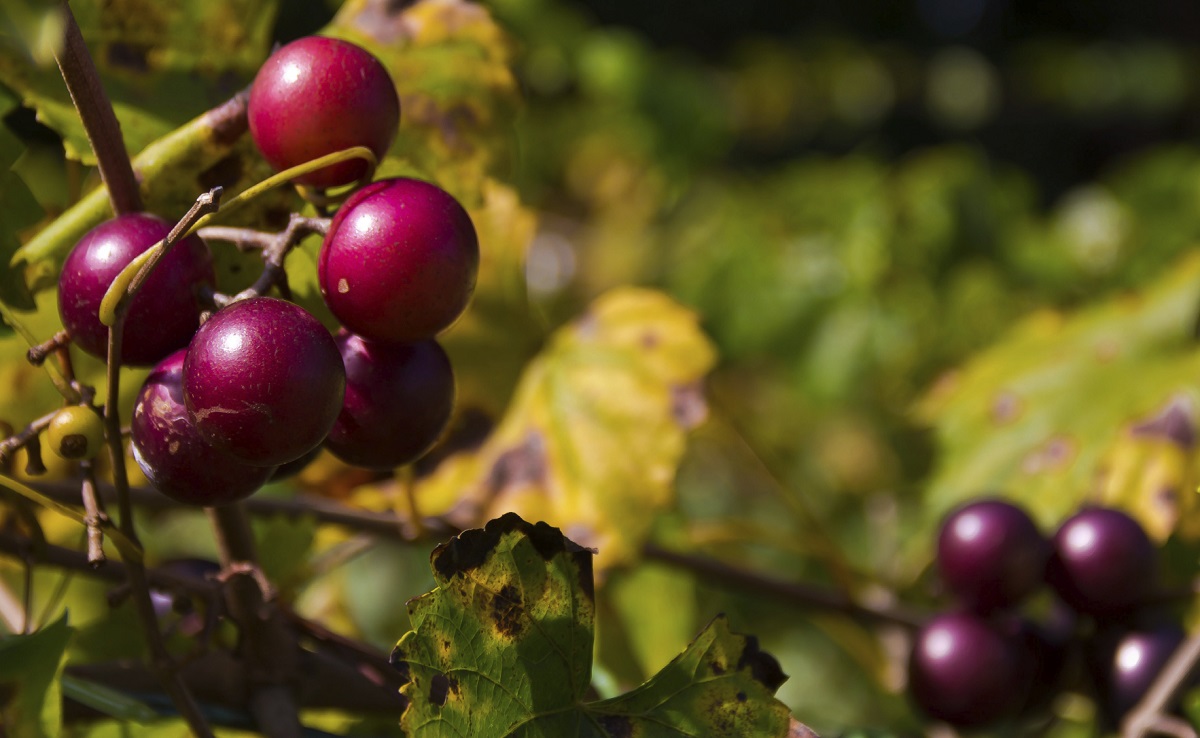Muscadine Grapes

In 2002 the New York Times published a food article detailing a rediscovery of native Eastern grape varieties among chefs throughout the city (http://www.nytimes.com/2002/10/02/dining/american-grapevines-set-cooks-buzzing.html). Chefs in the article espoused the grapes’ unique flavors, and superior cooking characteristics to California and European grapes. The Eastern United States is the native home to a number of grape varieties including Concord grapes in the Northeast and Muscadine grapes in the South. Most of us have long been indifferent to these native varieties that have been here longer than we have, as we are unfamiliar with them and unsure how to use them. “Do we eat them raw, but the seeds are so annoying!” “Do we cook them, but how?” Thirteen years later, in 2015, it would be stretch to say that these grapes have taken off and are now popular in food culture. But, as local food and farmers’ markets continue to gain in popularity, these native grapes do seem to be gaining ground.
Muscadine grapes are native to the southern United States, as they take very well to our humid and hot summers. They have tough skins and are more acidic and less sweet than the table grape varieties that we are accustomed to eating from California. They also have seeds, which turns many people off to fresh eating. However, there is something classically southern and romantic about these grapes. The vines themselves are perfectly beautiful. They drape over trellises, occupy terrace walls, and line garden walkways throughout the south. Scuppernong grapes (a variety of Muscadine) are even the North Carolina state fruit! So, how do we best enjoy this fruit that we have chosen to represent our own state? Like a lot of things in Southern cooking, the best results are often achieved by taking it slow and enjoying the process.
Sauces, jams, jellies, and even wine are where the southern Muscadine truly shines. Sweet Muscadine sauces are the base in many southern desserts, like Muscadine Grape Hull Pie. They can be cooked into jams or jellies and stored throughout the winter. Many native southerners have been making Muscadine wine for generations. However, as documented in the 2002 New York Times article, their applications can extend beyond sweets, even into savory entrees. Whether you are interested in charting new territory with our state fruit, or just enjoying some classic southern sweets, the Muscadine is a fruit worth getting to know.
READ MORE!
View our current harvest:
Browse our Products
Muscadine grapes are native to the southern United States, as they take very well to our humid and hot summers. They have tough skins and are more acidic and less sweet than the table grape varieties that we are accustomed to eating from California. They also have seeds, which turns many people off to fresh eating. However, there is something classically southern and romantic about these grapes. The vines themselves are perfectly beautiful. They drape over trellises, occupy terrace walls, and line garden walkways throughout the south. Scuppernong grapes (a variety of Muscadine) are even the North Carolina state fruit! So, how do we best enjoy this fruit that we have chosen to represent our own state? Like a lot of things in Southern cooking, the best results are often achieved by taking it slow and enjoying the process.
Sauces, jams, jellies, and even wine are where the southern Muscadine truly shines. Sweet Muscadine sauces are the base in many southern desserts, like Muscadine Grape Hull Pie. They can be cooked into jams or jellies and stored throughout the winter. Many native southerners have been making Muscadine wine for generations. However, as documented in the 2002 New York Times article, their applications can extend beyond sweets, even into savory entrees. Whether you are interested in charting new territory with our state fruit, or just enjoying some classic southern sweets, the Muscadine is a fruit worth getting to know.
READ MORE!
View our current harvest:
Browse our Products
